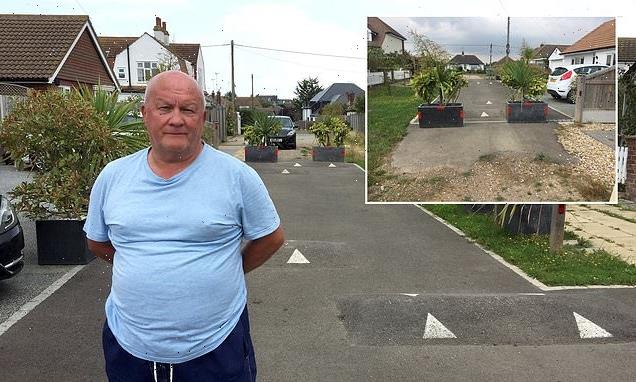Pensioner installs £8,000 speedbumps to stop speeding drivers
Pensioner installs £8,000 speedbumps and his own 5mph limit on 100-yard stretch of road outside his home to stop speeding drivers using road as a cut-through
- Adrian Kent paid for speedbumps to be put along the street in Whitstable, Kent
- The pensioner installed the bumps along the 100 yard stretch of private road
- Speeding vehicles were flicking stones onto houses and smashing windows
A pensioner spent thousands of pounds making his road ‘the shortest in the country with speedbumps’ after his grandchildren became too scared to play outside.
Adrian Kent said he was forced to try and tackle reckless drivers pelting down his road after vehicles, include a car transporter, were repeatedly flicking stones onto houses, even allegedly smashing a car window.
With the help of a neighbour, Mr Kent paid £8,000 for new speedbumps to be put along the narrow private street in Whitstable, Kent, which is just over 100 yards long and is the responsibilty of the homeowners rather than the council.
But the DIY ramps failed to stop motorists from hurtling through the 5mph zone at speeds of up to 40mph.
He said: ‘People were happy to tear down it at 30 to 40mph.
Adrian Kent (pictured) said that his grandchildren became too scared to play outside due to lorries driving too fast down his road and flicking stones through windows
‘A neighbour’s car window was smashed by stones flicking up and some of the stones are quite big.
‘We’ve even had a car transporter through here. We moved here in 2018 and by 2019 we thought we would try to do something about it.
‘I thought if we were to repair it we would do a permanent surface so we decided to put the bumps down.
‘We spoke with the neighbours and they agreed but they weren’t interested in paying.’
Residents have been joking about the seemingly excessive measure, with one on Facebook posting: ‘Is the shortest road in the country with speed bumps?’
Another laughed: ‘Must have a councillor living in the street.’
The street (pictured) in Whitstable, Kent, is only 100 yards long, making it one of the shortest roads with speedbumps in the country
The most effective method of stopping speeding traffic has been placing planters at the end of the street (pictured)
Despite the cost of the deterrents racking up to £8,000, Mr Kent thought the way people responded was amusing.
He said: ‘It’s quite funny when you think about it. Maybe I could enter the Guinness Book of Records.’
Despite the laughs, another resident sincerely jumped to his defence and praised him for taking action.
She said: ‘We live close-by and have witnessed, prior to these changes to the road layout, two or three occasions where delivery drivers have nearly hit the children from Swalecliffe Primary School as they walk home.
‘The road was often used as a cut-through and was becoming more dangerous by the day.
‘I can only thank the homeowners for making this safer for the children and other pedestrians at their own expense.’
Mr Kent has admitted that paying and installing the speedbumps was a waste of time and money, especially when a cement mixer spilt its load all over the street after hitting one of the bumps
But after installing the tarmac and the speedbumps, Mr Kent admitted it was a waste of time and money.
The final straw came when a cement mixer hit one of the bumps and spilt its load all over the street, leaving Mr Kent with a two-hour cleaning operation.
Since this set-back he blocked off part of the road with planters, and for the past 18 months Kent County Council Highways, the fire service and police have raised no objections.
With the help of a neighbour, Mr Kent paid for the speedbumps to be installed himself, which cost around £8,0000
The planters have been a success, he said: ‘It’s lovely and quiet now, but the amount of traffic coming down here was quite something before.
‘I had the feeling people liked driving on the dirt road – especially the young guys.
‘It has given us long-term stability over the road surface and it is safer.’
Source: Read Full Article






